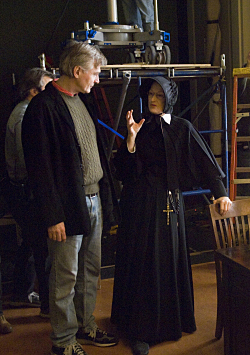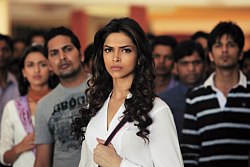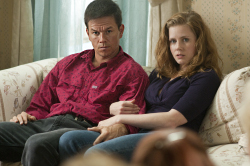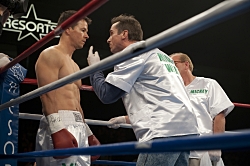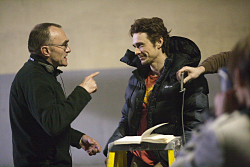An Oscar winner for his 1987 screenplay for Norman Jewison’s Moonstruck, and the screenwriter behind a variety of Hollywood films including Alive and Congo, Miramax Films’ Doubt is John Patrick Shanley’s second film as a director, following his 1990 directorial debut Joe Versus the Volcano.
Popular on LondonNet
During the protracted hiatus between his two directorial efforts Shanley contracted advanced glaucoma. Going blind in one eye, and then the other, only after a series of operations was his sight fully restored.
Now 58, it meant that when producer Scott Rudin approached him to adapt his own 2004 play Doubt, which had won him a host of awards including a Tony and the Pulitzer Prize, Shanley jumped at the chance. Set in 1964, in a Brooklyn Catholic school very much like the one Shanley attended as a child, it tells of devout nun Sister Aloysius (played in the film by Meryl Streep), who accuses her colleague, Father Flynn (Philip Seymour Hoffman) of sexually abusing the school’s only black pupil, Donald. Below Shanley discusses the essence of Doubt and how he got through his horrendous physical ailments before returning to the director’s chair.
More Doubt Interviews:
– Amy Adams
– Philip Seymour Hoffman
– Meryl Streep
– Viola Davis
How did you get involved with Scott Rudin, the producer, on Doubt?
I’ve known Scott for a long time. After I did Joe Versus the Volcano, he took me out to lunch and said, ‘I think you should do another film. I want to do it with you.’ And I said, ‘I don’t want to do another film.’ Then when Doubt came up eighteen years later, and I hadn’t directed anything in the interim…Scott had been one of the producers of the play. He said, ‘Look, I think this wants to be a film and I think you should direct it.’ And I said, ‘I think you’re right.’
So you never doubted it could be a film?
I knew that it was my fate. I knew that it was going to be very hard and I didn’t know how to do it. I didn’t pretend to have an easy answer. I was like, ‘OK, I’m going to try and turn this into a celebration of the dialectic on the big screen. I’m going to try and do a film where they talk a lot and you like it.’ It was the most difficult screenplay I ever wrote, as I had to solve that problem one page at a time – with a lot of devices, a lot of tricks. All of which had to be not simply camera moves, but things that happened between the participants and the physical environment that they were inhabiting, that lent forward movement to the story and motivated camera movement that was not simply for visual interest. So lights blow out, leaves blow in windows, napkins flutter…
There are also no pupils in the play…
There are no children in the play. There is no congregation in the play. So there’s no classrooms, there’s no lunchrooms. You don’t see what happens in the convent. You don’t see how they live in the rectory. So after an initial big struggle, I suddenly realised that it was a great asset that I could make it as a film. There was a lot of things I had hypnotised myself into doing without because of the economics of theatre, that I now could include and celebrate in a film. Everyone who saw the play and heard it was going to be a film asked me the same question: ‘Are you going to show the kid they’re talking about?’ And I said, ‘Yeah! You have to.’ It would be so coy to attempt to do this film with this off-stage character who is so important. But a lot of people were very concerned. They thought that wasn’t going to work.
When you wrote Doubt as a play, did you feel any pressure to follow it up?
I did another play the next season, which was the second play in the trilogy – called Defiance. It was about the military. I wanted to get that right out there so I wouldn’t be dealing with that. I was happy that I did that. When I won the Pulitzer, I made it my business to finish the play the night before.
When do we get to see the third play?
I haven’t done that yet. I’m going to take my bloody time on the third one!
What links Defiance to Doubt?
The play is about hierarchy. It’s about where does authority come from, the uses of authority – that’s always been interesting to me. So if somebody tells me to do something, and I have to do it, I’m like, ‘Where do you get the authority to tell me what to do?’ Not necessarily because I’m objecting. I’d simply like to know. So in the Catholic Church, it’s, ‘I get it from the Pope and he gets it from God.’ And in the military, they get it from the President of the United States, who gets it from the people. And that’s like a snake eating its own tail. But it’s worthy of looking at – and what people do as a result of buying into that, being a member of that hierarchy, being a member of the military, being a member of the clergy…it reveals a lot about a culture.
Did you ever want to direct the stage production of Doubt?
Well, I couldn’t do it, because I had three productions on at the same time. I had three different plays going on, and I was in rehearsal with all three. So I had three different directors and just walked from director to director.
What was it that interested you when you wrote it?
I went to this church school in the Bronx. The story is set in 1964 and that was a time during which you felt you were in this little Bronx working class enclave and like the world was an unchanging place, and the values were shared by everyone, and that nothing would ever change. And yet, though, there was this rumble just over the hill of the Sixties. This gigantic noise heading your way. All of these things that seemed so permanent were going to be swept away. And that there was good and bad things about that.
Like what?
When everybody assumes that they share the same values, they share also a certain blindness. I think the utter lack of vigilance and profound credulity of people of that time was what allowed the church scandals to ever happen in the first place. It was too obvious if you were paying any attention whatsoever to the amount of it taking place. It calls for a kind of cultural blindness. I was reminded in more recent times of the time I was living in a few years ago – let’s say in the run-up to the invasion of Iraq – that again there was this kind of certitude and blindness, and it had echoes for me in this earlier time.
So you felt primed to tell this story now?
Yes. I found myself living in an era of extreme advocacy, of people yelling at each other and everybody being in very entrenched positions, and not really listening to anybody else. It was all about power, and true discourse had fallen by the wayside. And anybody that expressed the idea of being in doubt about something was perceived to be weak. I thought doubt was a hallmark of wisdom and an active and ongoing enterprise, and that dogma was a dead end and the shutting down of the frame. So I wanted to write about those issues – a time of change, when valuable things are going to be lost and valuable things are going to be found.
How do you view Sister Aloysius as a character?
I think of Sister Aloysius as a submarine commander on a broken down old submarine – lightbulbs going out, the wind blowing in – trying to keep the future out. And she’s right. If you were a college professor in Germany in 1931, there are good reasons to not want the future along. It’s not always good to move on, if the new thing is Adolf Hitler. There were things that were lost in terms of classical education in this country.
Do you understand why children are taught religion?
It’s certainly very comfortable. In the Catholic Church, they give you the Catechism and it’s not a thick book and it’s got all the answers. It’s very comforting to a kid. And children need to be comforted to a certain degree, and at a certain moment that explodes. The new wine breaks the old bottle. It doesn’t answer all the questions anymore, and you realise that life is more complex. Certainly, psychologically undeveloped people need an eco-skeleton of belief in order to hold them together. Communities hold drunks together. There are drunks in certain communal cultures that are protected. But if they leave that environment and go to the big city, they fall to pieces and never recover. But the community takes care of them, and I think that’s a possibility.
Can you talk about the casting? Did Meryl Streep sign on straight away?
She did say ‘yes’ right away. And the great thing about working with somebody like Meryl or Phil, or actually this whole cast, is when you work with really good people, your job is easier! It’s not harder. People have asked me if I was intimidated by Meryl, and I wasn’t particularly. We had lunch and we hit it off, and spoke the same language. If it was about me proving myself to Meryl, that would be very uncomfortable. But if it’s about this – in other words, we’re trying to tell this story, well that’s something we can all concentrate on and do the best that we can to make it happen. And that’s generally my working attitude. But she was very collaborative, very present, and very open to direction, if necessary. I did not excessively intrude on what she was doing, because her choices were by and large incredibly good ones. She would come over to me after a take and say, ‘Want something else?’ And I would say, ‘Give me something else.’ If I felt there was something that we should have in the can, I would push her until we got that, but it was a very good collaboration.
What about Amy Adams?
Yeah. She’s having a suddenly fabulous career. I think she’s really happy about it and she’s a terrific person, so I’m glad for her. She’s very gifted. At one point, she had this big speech that she had to make to Meryl. We did eleven takes, and usually I do three takes. But it was a difficult speech to find the right tone, where it didn’t get too big but she really got to go where she needed to go. It took a little time. That was the only scene that took time with her. She was very able to go from talking to you about sports to going in front of the camera and bursting into tears. She had a tremendous facility, an ability to multi-task. Very good to work with. Very close to the character.
Did you ever consider casting the original stage cast?
Well, Doug Hughes directed the stage version, and did a great job. I felt like if I took his cast, that I would be taking his work and putting my name on it. I hadn’t directed a movie in eighteen years. That was an issue. I wanted to do something that was an original statement of mine and take a fresh crack at the material.
Why has there been this gap of time between directing two films?
Well, when I did Joe Versus the Volcano, I was living in a hotel out here for ten months, which is antithetical to my nature. I had been working very hard for a very long time, probably fifteen years, writing play after play, film after film. I did four films in a row, very fast, and I felt I lost my way. I felt I needed to go home and find my home again and find my feet again and find something to write about that meant something to me. And that took a while. Then I adopted two children at birth, and I didn’t want to leave them for an extended period. Then I got a really bad eye disease – I had five rounds of eye surgery and went blind in one eye and then the other eye and that went on for three or four years. When this came up, my kids were fifteen and my eyes were fine, so I took it!
What was the problem you had with your eyes?
Advanced glaucoma. Untreatable with drugs. They do the surgery and puncture a hole in your eye, a permanent hole to keep the pressure down. The hole was too big. The eye deflated. And it happened with both eyes in turn. They had to undo those surgeries, and do them again. Each one of them takes a long time. You have to go through a significant rehabilitation after those surgeries – a lot of eyedrops.
That must’ve been horrific. What did learn from this?
I guess with everything positive and negative that’s happened to me – mostly negative though – you learn something. I can understand another page of Shakespeare. You have to live a life in order to have something to write about and I’m afraid adversity is the great teacher.
There’s been plenty of Oscar buzz around Doubt. How does that feel?
It’s fine. I guess buzz is different to winning an Oscar. I won an Oscar and it’s a miracle when you win an Oscar. I won an Oscar for Moonstruck and I went back to New York and went to a bar with a bunch of friends, who are all these impoverished playwrights. We went to some dive bar, and we ordered some drinks and I took the Oscar out of my bag and I put it in the middle of the table. The great thing about New York is we were there for hours and the waitress never mentioned it. Finally, she was doing the cheque and said, ‘Who’s is that?’
Did winning the Oscar mean much to you?
I have to say winning the Oscar for Moonstruck was a big kick. It was really fun. I was embraced by Gregory Peck and kissed by Audrey Hepburn. I was not a kid. I was at that time 37. It was terrific and I was very happy that I was able to enjoy it. Sometimes, life is so hard and you can’t get your armour off in time to let something good in. I managed to drop my guard and really enjoy it. It was great fun. That was lovely. And it’s wonderful to win the Pulitzer…it just has a nice ring to it!
It must’ve been crazy around this time…
Yeah, yeah. I did four films very fast, all written on spec. I did Five Corners, and we shot that, then one week later we started shooting Moonstruck. And then we finished Moonstruck and two or three months later, we started shooting The January Man. Then the writer’s guild strike hit, then when that was over we went into production on Joe Versus the Volcano. And in between I was doing plays all the time. It was a very, very intense period.
With the likes of Alive and Congo, your career has been very varied…
I like to try different things. I wrote an animated feature for Steven Spielberg, called We’re Back. Then I wrote Live from Baghdad for HBO, about CNN and the Gulf War. That’s when I started to get into a real political vein. I wrote a play called Dirty Story, which was about Israel and the Palestinians. It was very well thought of by the New York critical establishment. I made this decision when I was 35 – that I’d write about personal matters until I’m 40, then I’m going to turn outward and write about society more. And that’s what I did.
So what is next for you?
I don’t know. There are a couple of things I could do, things I’ve written. And there’s things other people are interested in me doing. But I’m going to take a couple of months now, get some sleep and see where I come out.


